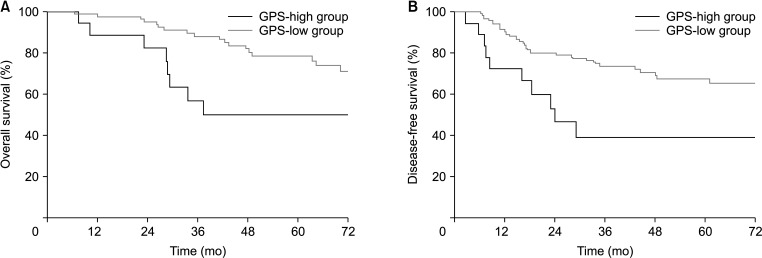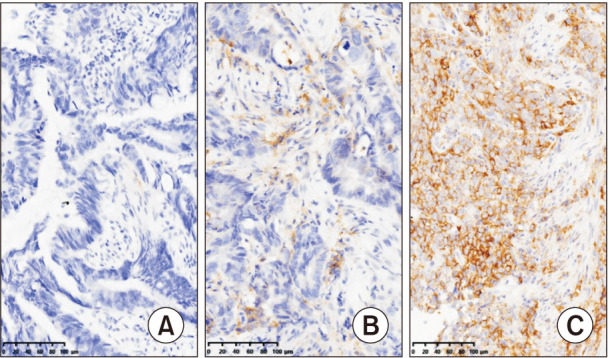Ann Surg Treat Res.
2022 Mar;102(3):153-158. 10.4174/astr.2022.102.3.153.
Glasgow prognostic score and combined positive score for locally advanced rectal cancer
- Affiliations
-
- 1Department of Radiation Oncology, The Cancer Hospital of the University of Chinese Academy of Sciences (Zhejiang Cancer Hospital), Institute of Basic Medicine and Cancer, Chinese Academy of Sciences, Hangzhou, China
- 2Zhejiang Key Laboratory of Radiation Oncology, Hangzhou, China
- 3Department of Pathology, The Cancer Hospital of the University of Chinese Academy of Sciences (Zhejiang Cancer Hospital), Institute of Basic Medicine and Cancer, Chinese Academy of Sciences, Hangzhou, China
- KMID: 2526936
- DOI: http://doi.org/10.4174/astr.2022.102.3.153
Abstract
- Purpose
This study was performed to investigate the association of Glasgow prognostic score (GPS), combined positive score (CPS), and clinicopathological characteristics of locally advanced rectal cancer.
Methods
Between February 2012 and February 2018, 103 patients with locally advanced rectal cancer treated by neoadjuvant chemoradiotherapy and total mesorectal excision (TME) were retrospectively evaluated.
Results
According to the classification of the GPS, 85 (82.5%), 13 (12.6%), and 5 patients (4.9%) were classified as a score of 0, 1, and 2, respectively. Patients were classified into the GPS-low group (GPS of 0, n = 85) and GPS-high group (GPS of 1 or 2, n = 18) with an area under the curve of 0.582 for overall survival (OS). The mean programmed death-ligand 1 (PD-L1) CPS of the whole group was 2.24 (range, 0–70). The PD-L1 CPS of the GPS-high group was higher than the GPS-low group (P < 0.001). Multivariate analysis by Cox proportional hazards model indicated that GPS was associated with OS and diseasefree survival (DFS). Furthermore, PD-L1 CPS was associated with DFS (hazard ratio, 1.050; 95% confidence interval, 1.017– 1.083; P = 0.003).
Conclusion
Elevated GPS was related to the PD-L1 CPS. GPS and PD-L1 CPS were associated with the prognosis of locally advanced rectal cancer treated with neoadjuvant chemoradiotherapy followed by TME.
Figure
Cited by 1 articles
-
Neoadjuvant chemoradiotherapy determines the prognostic impact of anastomotic leakage in advanced rectal cancer
Bo Young Oh, Yoon Ah Park, Jung Wook Huh, Yong Beom Cho, Seong Hyeon Yun, Hee Cheol Kim, Woo Yong Lee
Ann Surg Treat Res. 2022;103(4):235-243. doi: 10.4174/astr.2022.103.4.235.
Reference
-
1. Bosset JF, Collette L, Calais G, Mineur L, Maingon P, Radosevic-Jelic L, et al. Chemotherapy with preoperative radiotherapy in rectal cancer. N Engl J Med. 2006; 355:1114–1123. PMID: 16971718.
Article2. Conroy T, Bosset JF, Etienne PL, Rio E, François É, Mesgouez-Nebout N, et al. Neoadjuvant chemotherapy with FOLFIRINOX and preoperative chemoradiotherapy for patients with locally advanced rectal cancer (UNICANCER-PRODIGE 23): a multicentre, randomised, open-label, phase 3 trial. Lancet Oncol. 2021; 22:702–715. PMID: 33862000.
Article3. Abdul-Latif M, Townsend K, Dearman C, Shiu KK, Khan K. Immunotherapy in gastrointestinal cancer: The current scenario and future perspectives. Cancer Treat Rev. 2020; 88:102030. PMID: 32505807.
Article4. Yuki S, Bando H, Tsukada Y, Inamori K, Komatsu Y, Homma S, et al. Short-term results of VOLTAGE-A: nivolumab monotherapy and subsequent radical surgery following preoperative chemoradiotherapy in patients with microsatellite stable and microsatellite instability-high locally advanced rectal cancer. J Clin Oncol. 2020; 38(15 Suppl):4100.
Article5. Alexander PG, McMillan DC, Park JH. A meta-analysis of CD274 (PD-L1) assessment and prognosis in colorectal cancer and its role in predicting response to anti-PD-1 therapy. Crit Rev Oncol Hematol. 2021; 157:103147. PMID: 33278675.
Article6. Tuomisto AE, Mäkinen MJ, Väyrynen JP. Systemic inflammation in colorectal cancer: underlying factors, effects, and prognostic significance. World J Gastroenterol. 2019; 25:4383–4404. PMID: 31496619.
Article7. Feng Y, Liu L, Zhu Y. Systemic inflammation score in locally advanced rectal cancer patients following total mesorectal excision. Onco Targets Ther. 2019; 12:6617–6622. PMID: 31695404.8. Yassin M, Sadowska Z, Djurhuus D, Nielsen B, Tougaard P, Olsen J, et al. Upregulation of PD-1 follows tumour development in the AOM/DSS model of inflammation-induced colorectal cancer in mice. Immunology. 2019; 158:35–46. PMID: 31429085.
Article9. Huemer F, Klieser E, Neureiter D, Schlintl V, Rinnerthaler G, Pagès F, et al. Impact of PD-L1 scores and changes on clinical outcome in rectal cancer patients undergoing neoadjuvant chemoradiotherapy. J Clin Med. 2020; 9:2775.
Article10. McMillan DC, Crozier JE, Canna K, Angerson WJ, McArdle CS. Evaluation of an inflammation-based prognostic score (GPS) in patients undergoing resection for colon and rectal cancer. Int J Colorectal Dis. 2007; 22:881–886. PMID: 17245566.
Article11. Lee SC, Huh JW, Lee WY, Yun SH, Kim HC, Cho YB, et al. Prognostic value of serum inflammatory markers in colorectal cancer. Int J Colorectal Dis. 2020; 35:1211–1219. PMID: 32306074.
Article12. Kulangara K, Zhang N, Corigliano E, Guerrero L, Waldroup S, Jaiswal D, et al. Clinical utility of the combined positive score for programmed death ligand-1 expression and the approval of pembrolizumab for treatment of gastric cancer. Arch Pathol Lab Med. 2019; 143:330–337. PMID: 30028179.
Article13. Wainberg ZA, Fuchs CS, Tabernero J, Shitara K, Muro K, Van Cutsem E, et al. Efficacy of pembrolizumab (pembro) monotherapy versus chemotherapy for PD-L1–positive (CPS ≥ 10) advanced G/GEJ cancer in the phase II KEYNOTE-059 (cohort 1) and phase III KEYNOTE-061 and KEYNOTE-062 studies. J Clin Oncol. 2020; 38(4 Suppl):427.14. Lee KS, Kim BH, Oh HK, Kim DW, Kang SB, Kim H, et al. Programmed cell death ligand-1 protein expression and CD274/PD-L1 gene amplification in colorectal cancer: implications for prognosis. Cancer Sci. 2018; 109:2957–2969. PMID: 29949671.
Article15. Väyrynen JP, Kantola T, Väyrynen SA, Klintrup K, Bloigu R, Karhu T, et al. The relationships between serum cytokine levels and tumor infiltrating immune cells and their clinical significance in colorectal cancer. Int J Cancer. 2016; 139:112–121. PMID: 26874795.
Article16. Turner N, Wong HL, Templeton A, Tripathy S, Whiti Rogers T, Croxford M, et al. Analysis of local chronic inflammatory cell infiltrate combined with systemic inflammation improves prognostication in stage II colon cancer independent of standard clinicopathologic criteria. Int J Cancer. 2016; 138:671–678. PMID: 26270488.
Article
- Full Text Links
- Actions
-
Cited
- CITED
-
- Close
- Share
- Similar articles
-
- Neoadjuvant chemoradiotherapy determines the prognostic impact of anastomotic leakage in advanced rectal cancer
- The Effects and Surgical Morbidity of Preoperative Combined Chemoradiotherapy for Locally Advanced Rectal Cancer
- The Clinical Significance of Cathepsin D and p53 Expressionin Locally Advanced Rectal Cancer
- Surgical issues in locally advanced rectal cancer treated by preoperative chemoradiotherapy
- The Outcome of Preoperative Chemoradiation to Locally Advanced Rectal Cancer



